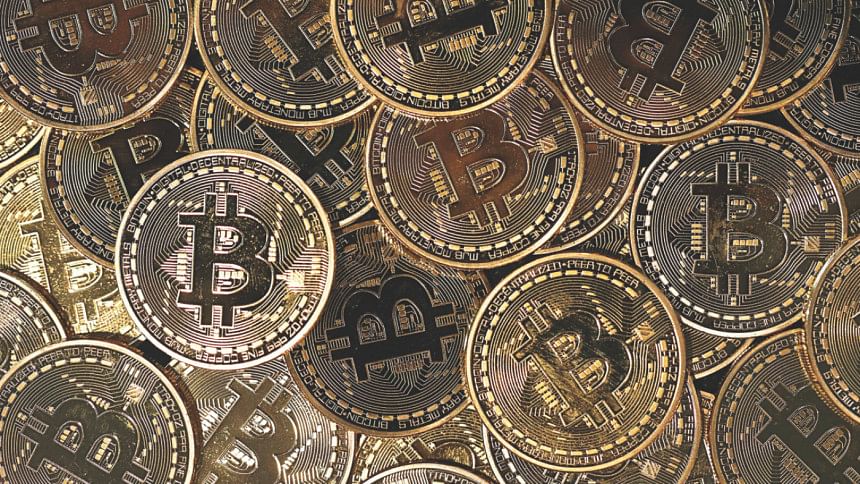Everything you need to know

WHAT IS BITCOIN?
The world is in an economic shambles. Automation killing jobs; currencies in a wild rush; wars looming up; people fighting over eggs and what not. What if there was a disruption in the system trying to come up with a completely new economy in the virtual realm of this world; decentralized and operating independently of middlemen to follow through transactions? Seems quite possible. By definition, bitcoin is "a digital currency in which encryption techniques are used to regulate the generation of units of currency and verify the transfer of funds, operating independently of a central bank." In layman's terms, think of it like this; gold is mined and traded in exchange for money all over the world, where the transaction is possibly processed by a shady bloke who wants to extort as much profit as he can from the miner. To overcome such issues, wouldn't it be much simpler if you could directly mine money instead of the gold, all by yourself? Well, bitcoin implements exactly that.
HOW DOES THE SYSTEM WORK?
Bitcoins are generated through a process called 'mining'. The computer where the mining application is run is given a complex mathematical problem to solve, and the goal is a 64-digit number. If your computer is able to solve the problem, you will be the proud parent of a number of bitcoins. These bitcoins can be stored in digital wallets – so in theory, not very different than a PayPal or bKash account you keep money in, but can you generate more money in these accounts without using an actual currency? Unfortunately, no. The reason they call it mining is because it follows a very similar principal to the actual idea of a mine. There is a predetermined number that can ever be mined in the entire system, that is, 21 million bitcoins that will ever be created in total. It's more like digging for a natural resource, like gold for example, to use as a currency rather than printing money in the real world.
It is organized through a peer-to-peer network known as a blockchain. This ingenious but simple invention at its core is basically an online ledger that keeps an incorruptible record of all transactions made with bitcoins. When a transaction is completed, it is logged in a block that becomes a part of a permanent database of these several back-and-forths.
As of today, a single Bitcoin is worth about 515k BDT or $6100. Putting the boom into perspective, Bitcoins were traded around the mid-$300 range in late 2014.
CAN YOU BE A BITCOIN MINER? SHOULD YOU?
You most definitely can. The bitcoin network pays back miners in bitcoin, or even fragments of it, for their contribution in the required computational power. The more computing power you can provide, the greater the chunk of award. It is technically possible to mine with your computer processor, but the days of mining with your CPU are long gone. Graphics cards offer a much faster way of solving problems, producing a much higher yield CPUs ever did. Even still, a very high amount of graphical processing power is required to actually make mining worthwhile. But there is a catch. Mining with GPUs will consume more in electricity than you likely will earn, which is why GPU mining is largely dead these days. ASIC or Application Specific Integrated Circuits are where the action is really at. After the release of ASIC, bitcoins can be mined at warp-speed with much lower power consumption figures than GPUs.
We now come to the important question, should you mine bitcoins if you're in Bangladesh? In a statement by the Central Bank released in 2014, the use of bitcoin was banned in the country under a law that regulates trading in foreign currency without clearance from the central bank. The reason stated a lack of a central payment system that could financially cause harm to people. Anyone convicted can earn a sentence of up to 12 years in jail and other fines.
SHOULD YOU PLAN YOUR RAGS TO RICHES BIOPIC RIGHT NOW?
The currency has been quite volatile from its birth. But according to forecasts by industry professionals and the recent soar in popularity, a single bitcoin might reach prices upwards of $500k by 2030. Investors who have purchased bitcoins so far have done surprisingly well till now. It is nearly impossible to predict the values of bitcoin or any other cryptocurrency. Compared to investing in a disciplined, rudimentary stock market, it is hard to define an inherent magnitude to bitcoins or any other cryptocurrency. A civil war is cooking between many other different cryptocurrencies - which are much more technologically advanced and efficient, and by the looks of it, it would be wise to take any tips regarding bitcoin investments with a grain of salt, as even though the market has seen incredible returns this year, it does not take rocket science to figure that prices won't keep going up forever.

 For all latest news, follow The Daily Star's Google News channel.
For all latest news, follow The Daily Star's Google News channel. 



Comments